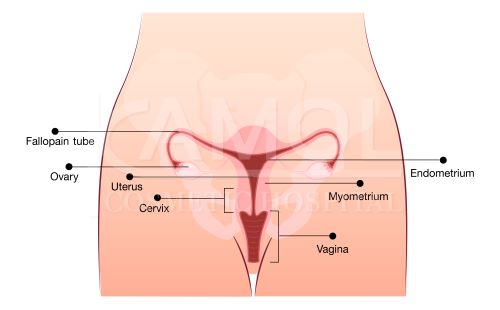¿Qué es MRKH?
MRKH significa síndrome de Mayer-Rokitansky-Küster-Hauser. Se trata de un trastorno congénito que afecta principalmente al aparato reproductor femenino. Las personas con síndrome de MRKH nacen con órganos reproductores subdesarrollados o ausentes, en particular el útero y la parte superior de la vagina.

Imagen 1 muestra el aparato reproductor femenino
El síndrome de MRKH suele diagnosticarse en la adolescencia, cuando una mujer joven no menstrúa o tiene dificultades para mantener relaciones sexuales debido a la ausencia de abertura vaginal. La causa exacta del síndrome de MRKH no se conoce del todo, pero se cree que es el resultado de un desarrollo anormal de los conductos de Müller durante el desarrollo fetal.
Existen dos tipos principales de síndrome de MRKH:
- Tipo I: En este tipo, sólo están afectados el útero y los dos tercios superiores de la vagina, mientras que los ovarios y los genitales externos (como los labios y el clítoris) se desarrollan con normalidad.
- Tipo II: Además de la ausencia de útero y de los dos tercios superiores de la vagina, las personas con síndrome de MRKH de tipo II también pueden presentar anomalías en los riñones, el esqueleto u otros órganos.
El tratamiento del síndrome de MRKH suele centrarse en abordar las necesidades funcionales y psicológicas de las personas afectadas. Aunque actualmente el síndrome de MRKH no tiene cura, existen varias opciones de tratamiento para abordar los problemas asociados:
- Dilatación vaginal: La terapia de dilatación vaginal consiste en utilizar dilatadores vaginales progresivamente mayores para estirar y alargar el tejido vaginal existente. Esto puede ayudar a crear un canal vaginal funcional que permita las relaciones sexuales y reduzca las molestias.
- Procedimientos quirúrgicos: Las opciones quirúrgicas para el síndrome de MRKH incluyen cirugía de reconstrucción vaginal (vaginoplastia) para crear o alargar la vagina, así como procedimientos para tratar anomalías asociadas como anomalías renales o esqueléticas.
- Técnicas de reproducción asistida (TRA): En los casos en que los ovarios están presentes y funcionan con normalidad, las personas con síndrome de MRKH pueden someterse a una extracción de óvulos y a una fecundación in vitro (FIV) utilizando una portadora gestacional (madre de alquiler) para llevar un embarazo a término.
- Apoyo psicológico: Afrontar el diagnóstico del síndrome de MRKH y los retos que conlleva puede ser emocionalmente difícil. El apoyo psicológico, el asesoramiento y los grupos de apoyo pueden ayudar a las personas y a sus familias a superar los aspectos físicos y emocionales de vivir con el síndrome de MRKH.
El síndrome MRKH es relativamente poco frecuente y se da aproximadamente en 1 de cada 4.500 nacimientos femeninos. Debe su nombre a los médicos que lo describieron por primera vez: August Franz Joseph Karl Mayer, Carl Freiherr von Rokitansky, Hermann Küster y Georges André Hauser.
Es importante que las personas con síndrome MRKH colaboren estrechamente con un equipo de profesionales sanitarios, incluidos ginecólogos, endocrinólogos reproductivos, psicólogos y otros especialistas, para desarrollar un plan de tratamiento personalizado que aborde sus necesidades y objetivos únicos. Con el tratamiento y el apoyo adecuados, muchas personas con síndrome de MRKH pueden llevar una vida plena.

